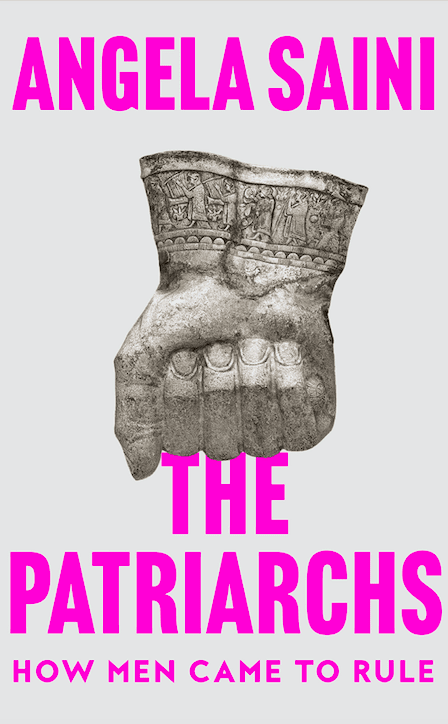Award-winning British author, broadcaster and journalist Angela Saini – who has written and reported for the likes of The Guardian, New Scientist, and the BBC – has just published her fourth book The Patriarchs: How Men Came To Rule. Don’t assume it’s going to be railing against men or that it will be a pointy-headed polemic. It’s a very readable and essential contribution to our understanding of patriarchy and the grip of male power: how it did or didn’t come about, and how it’s more fragile than we might think.
Now based in New York, Angela, who is of Indian descent, visited many countries to do her own research for The Patriarchs. Spending three years writing the book, she conducted many interviews and visited archaeological sites. She spoke to Sarah Lang over a Zoom call from New York.
Here’s part one of the two-part conversation!
Capsule: Hi Angela! If someone asked you at a social gathering ‘what brought about the patriarchy?’, what would your answer be? Would it be ‘it’s complicated – read my book?’
Angela: This is what I face after every book I write! If there was an easy way to answer that question, I wouldn’t have written the book at all.
I’d imagined that a book called The Patriarchs would be railing against patriarchy, saying it’s always been there and that’s why it’s so hard to dismantle. My assumptions were wrong. Do you think any other readers will be surprised?
I hope so. We have so many preconceptions. I think many people see the patriarchy as this monolithic thing that has always been there – so we can become almost fatalistic, feeling it’s impossible to fight against it. So I ask: what is the patriarchy, really? The answer that I came up with is that, to many of us, the patriarchy feels much bigger and more solid than it is, when actually it’s far more fragile and has to be constantly reasserted. It’s not something that was invented once upon a time and now we’re stuck with it. In some places it’s been established or reasserted within the last few centuries, and sometimes even now, so we have to be vigilant about how that happens.
After you published your book Inferior: How Science Got Women Wrong, did people keep asking you questions about the patriarchy?
Yeah. Inferior included a chapter on male domination and, afterwards, people kept asking me ‘if society hasn’t been always male-dominated, how do we explain the stranglehold of the patriarchy and how did we get to where we are now?’. I really didn’t have a good answer to that question. You might imagine there would be loads of books and scholarship on this topic but actually, there’s hardly anything. And now is a good time to look into it because of the way that archaeology and anthropology have been transformed in recent decades to look more closely at the gender question. There are many more archaeological finds now, and thanks to genetic analysis and new technology, we’re finding out things that we couldn’t before.
So, lo and behold, we’re finding women leaders, women kings, women warriors and women hunters who lived 9000 years ago, and it shatters this illusion that the past was this Flintstones world with Fred and Wilma’s gender roles. However, even with the new evidence we have about women’s agency and power in this history, we somehow still treat those women as ‘exceptions’. So our underlying narrative about the patriarchy [having always been there] hasn’t changed. But now that we have more evidence, should our narrative about the past be different? I think so.
You write that “we call patriarchy conspiratorial when actually it’s a slow grift that is still happening”?
Yes. There’s no big conspiracy. When certain things happen, some people say ‘Oh, that’s the patriarchy,’ almost as though it’s a conspiracy or an invisible force. We can’t really pin down who specifically is responsible for it, and yet it always seems to be there. Writing the book has taught me that ‘patriarchy’ was almost like a monster in my head. But if you look at the roots of patriarchy, and see how it’s actually fragile, it helps you understand ‘okay, I know now how to approach the fight for gender equality better’ rather than feeling helpless. The way that patriarchy works can sometimes be quite mundane, quite every day, so sometimes we just accept it without interrogating it very much. That’s how [patriarchal] systems stay alive.
You bust a myth in that you write that “there was never one single form of ‘patriarchal’ society, which was somehow introduced to Europe and Asia at the end of the Neolithic [period], before sweeping across the rest of the world”. You write that actually there was no dissemination of patriarchy at one specific point in time. Did you expect to find one major thing that brought about patriarchy?
Yes, part of me hoped there would be some big, historical moment that would explain everything! But that’s not how societies work. Most people don’t want a complicated answer but, actually, I think the complicated answer is the fascinating one. It’s much more interesting than being told, ‘well, something happened 5000 years ago to bring about patriarchy. We don’t know exactly what it was, but now we’re here’. What? Where do you go with that? You can’t do anything with that. So, I think it’s okay if the answer is complicated. Also, what complicates any universal theory of patriarchy is that gender inequality and oppression have never been the same for everyone everywhere.

What about the biological theory – that male domination is part of human nature?
Some people think that there’s something biological about patriarchy, or that male domination is hard-wired into our species as it is for chimpanzees. Some people will say that when we fight for equality we’re going against the grain of nature and that’s why it’s so difficult to achieve gender equality. If you think that, that’s your choice. In the book I essentially say that it’s possible there is some biological element to patriarchy, but let’s just imagine that there isn’t. So, what is an alternative narrative? How else can we explain history? It’s less about me debunking the biological element, and more just asking people to really interrogate the question.
You say there’s a temptation to simplify and exaggerate when it comes to the past – and point out that sometimes historians and scholars choose the narrative they want and thereby ‘flatten the past’?
Yes. I was surprised by how not careful and how lazy some academics can be.
As humans, do we crave a straight answer that fits into our own narrative about the world?
Many of us like simple stories that help us make sense of the world, in a way that isn’t too challenging. To some degree I think that taking that [position] prevents us having to be introspective and interrogate the question of ‘in what ways am I part of this patriarchal system?’.
You also write that some female scholars have created an alternative narrative of a matriarchal pre-history, when, actually, that’s not borne out by evidence?
Yeah. This theory proved particularly attractive to Western women with a shared set of experiences – and that’s understandable because it gave them a story that could make them feel better about the past and give them hope for the future. Even if it’s a myth, it still has value in the same way that religion offers us narratives that help us make sense of things and make us feel better. As a science journalist, my currency is facts and details, but I also recognise that as human beings, we need stories.
However, it’s a very binary way of looking at history to say it’s just one or the other: patriarchy or matriarchy. When you’re stuck in that binary opposition, you don’t concede that maybe things in the past could be more complicated and varied. Actually, what you see in some matrilineal societies [where ancestral descent is traced through maternal instead of paternal lines] is often men and women sharing power – and that that power fluctuates depending on the circumstances: age, seniority, the standing of your family, or another factor.
Are you worried that anything you’ve written will offend anybody or that there will be any ‘pushback’?
Probably, because the book does ‘go against’ a lot of predominant theories – including the idea that gender inequality and gender oppression began in the home. When actually, I say that it started in the state then filtered down into the home. So, things like that might sit contrary to other people’s work, and they may disagree, but I hope I’ve made a strong enough case. I might also get pushback because I do ask what role have women played in upholding these patriarchal structures. That’s not something people necessarily want to hear.
You say that in the book Against White Feminism, author Rafia Zakaria ‘documents how empty she has found some claims of global sisterhood’. What are your thoughts on more privileged, more well-off women being ‘complicit’ in the patriarchal system in a way?
Well, it’s not that we as women don’t care or are callous, but it’s because we each have to look out for ourself. So gender equality may be important to us, but we have our own status, opportunities and quality of life in mind, and that may be our focus. So it can seem like we’re complicit with the systems that oppress us, but really as individuals we’re working in our own best interests and perhaps we’re doing the best we can do at any one moment. We can’t blame individuals for that.


Stay tuned for part two!

